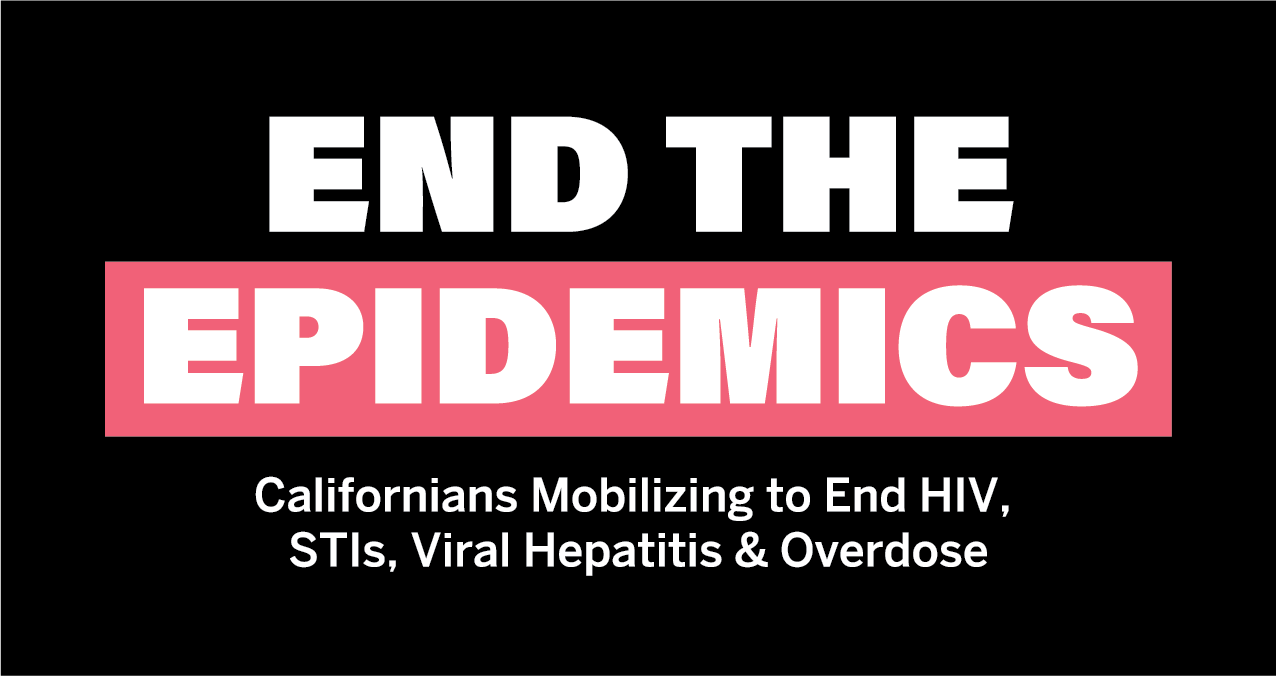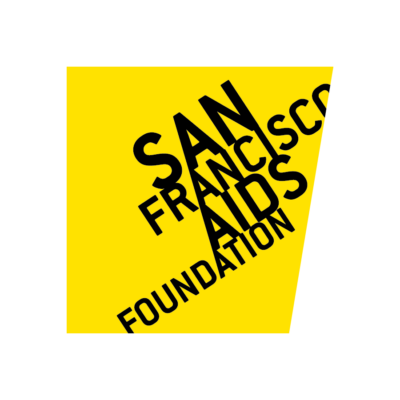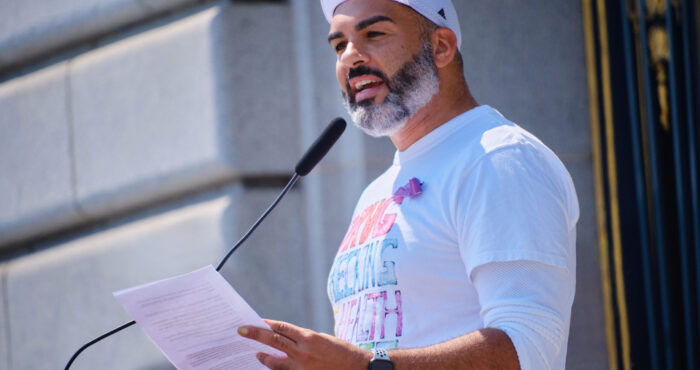End the Epidemics calls for $105m in California state budget

Chad Ngo, media@sfaf.org
Ryan Clary, ryan@endtheepidemicsca.org
March 16, 2022 – Today, End the Epidemics, a statewide coalition of more than 150 community organizations, called on Governor Newsom and the California Legislature to allocate $105 million in the state budget to address alarming increases in overdose deaths, skyrocketing rates of sexually transmitted infections (STIs), and ongoing high transmission rates of HIV and viral hepatitis. Assemblymember Evan Low (D-Silicon Valley), Chair of the California Legislative LGBTQ Caucus, will champion the budget request in the Legislature.
“With a historic budget surplus, the Governor and Legislature have a critical opportunity to improve the health of the most vulnerable and underserved Californians and reinvigorate the state’s efforts to address HIV, STIs, viral hepatitis, and overdose as we begin recovering from the pandemic,” said Assemblymember Low. “I applaud the Governor for proposing unprecedented new investments to rebuild the state’s depleted public health infrastructure, increase access to behavioral health services and substance use disorder treatment, and expand access to health care for all Californians regardless of immigration status. At the same time, however, targeted public health funding remains essential to ensuring that adequate resources are allocated to tackle these growing public health crises that disproportionately impact LGBTQ+, BIPOC, and other vulnerable communities.”
The End the Epidemics’ budget request will build upon and strengthen current efforts to address these epidemics, including the federal Ending the HIV Epidemic in the U.S. initiative and the Viral Hepatitis National Strategic Plan. Specifically, the coalition is urging the Governor and Legislature to support the following priorities:
- Syphilis and Congenital Syphilis Strategy: $49 million one-time funding to address alarming increases in cases of syphilis and congenital syphilis. There has been a 349% increase in reported syphilis cases over the past decade. Cases of congenital syphilis, which occur when syphilis is transmitted from a pregnant person to their child during pregnancy, increased 631% over the same period.
- Hepatitis B (HBV) Outreach, Screening, and Linkage to Care: $8 million one-time funding to identify best practices for improving HBV outreach, screening, and linkage to care. HBV continues to represent one of the largest unsolved health inequities in the U.S. and California. Asian Americans and Pacific Islanders are eight times more likely to die from HBV than white Americans.
- Hepatitis C (HCV) Prevention and Linkage to Care: $20 million ongoing funding to improve the capacity of local health departments and community organizations to provide HCV outreach, testing, and linkage to care and treatment services. The annual rate of HCV has tripled over the last decade driven primarily by injection drug use, with the highest rates among young adults.
- Health Equity and Harm Reduction Initiative: $20 million ongoing funding to sustain and expand the state’s current investment in lifesaving harm reduction infrastructure, including syringe services programs and overdose prevention programs. Over the course of the COVID-19 pandemic, the already alarming rate of drug overdose has significantly worsened – overdose deaths are up 45% in California since June 2020.
- Close the STI Coverage Gap for LGBTQ+ Californians: $7 million ongoing funding to support the expansion of access to STI testing and treatment services for low-income, uninsured LGBTQ+ individuals through the Family PACT program. The program already has a network of more than 2,200 culturally competent providers well-positioned to deliver STI services to this population.
- Increase Condom Access for Youth in Schools: $750,000 ongoing funding to make free condoms available in public high schools, middle schools, and school-based health centers that opt in to the program. Over half of all STIs in the state are experienced among California youth, but condom use among sexually active teens has declined significantly over the last decade.
Over the coming months, End the Epidemics will mobilize community members to educate their elected officials about the importance of these investments. The coalition will host a “Virtual Week of Action” from April 25-29, during which advocates will meet with their elected officials to share how the increased funding will positively impact their communities. More information about the End the Epidemics budget request can be found here.
Here is what the End the Epidemics Coalition says about the budget request:
“Over the last two years, public health departments and community organizations have been stretched to their limits responding to COVID-19 while simultaneously addressing the escalating rates of HIV, STIs, viral hepatitis and overdose,” said APLA Health Chief Executive Officer Craig E. Thompson. “As California moves into the next phase of the pandemic, it’s time to get serious about addressing these growing public health crises and accelerate prevention, testing, and treatment efforts. Absent these investments, public health efforts to address these epidemics will continue to fall woefully short. We applaud Assemblymember Low for his steadfast commitment to ending these epidemics and improving the health of LGBTQ+ and BIPOC communities in California.”
“The COVID-19 pandemic has highlighted and worsened the health inequities that LGBTQ+ people, undocumented Californians, the uninsured, low-income and our most vulnerable communities continue to face every day,” said Equality California Executive Director Tony Hoang. “It’s time for California to do our part to end the epidemics of HIV, viral hepatitis, other STIs and drug overdose that disproportionately impact our communities — and that requires bold investments in proven strategies to close health equity gaps. Equality California is proud to support these important budget proposals.”
“STI rates have reached historic highs and continue to climb in California and across the country. The COVID-19 pandemic has only reminded us that we must be vigilant and responsive when it comes to public health,” said Amy Moy, Chief External Affairs Officer of Essential Access Health. “Although the state has recently increased investments in STI prevention activities, additional resources are needed to ensure access to STI services for youth, and low-income, uninsured, LGBTQ+ Californians who face disproportionately high rates as a result of structural and systemic inequities. It’s time to invest in strategies we know work, including increasing free condom access for youth in public schools, and expanding Family PACT to create equitable pathways to STI care.”
“The Los Angeles LGBT Center urges our state legislators to approve the End the Epidemics budget proposal which will provide much-needed resources to end the HIV, STI, and overdose epidemics,” said Center Executive Director Joe Hollendoner. “These epidemics disproportionately affect Black and Latino gay men and transgender women of color and have been exacerbated during the COVID-19 pandemic. California has the ability to end these epidemics once and for all, but we need our legislators and Governor Newsom to make the necessary investments in our public health system as part of the state’s budget.”
“California’s overdose rates have almost doubled since last June despite millions of dollars of investment into substance use disorder treatment. The rates are highest among Black and Indigenous people which speaks to the gaps in drug user health care,” said Jenna Haywood, Associate Director of Community Mobilization for National Harm Reduction Coalition. “National Harm Reduction Coalition has surveyed participants of harm reduction programs across the state and found that stigma remains the number one barrier to accessing treatment, which is one of the reasons it is essential that we fund harm reduction at a commensurate level as other tools to ensure the health and wellbeing of people who use drugs regardless of the cessation of drug use. Our approach to substance use disorder, overdose, and other drug related harms needs to be multifaceted, this means parity of investment between prevention, treatment, harm reduction and recovery.”
“San Francisco AIDS Foundation strongly supports the End the Epidemics FY 2022-2023 California state budget proposal, which includes funding for critically-needed HIV, STI, overdose and viral hepatitis services,” said Tyler TerMeer, PhD, Chief Executive Officer of San Francisco AIDS Foundation. “The public health proposals prioritize services for those disproportionately affected by the epidemics who face significant barriers to comprehensive and respectful care, particularly BIPOC and LGBTQ+ communities as well as people who use substances. As one of the largest community-based LGBTQ sexual health care providers in the Bay Area, who also provides extensive harm reduction services, we know that a comprehensive response to skyrocketing overdose rates must also include infectious disease prevention and treatment, particularly viral hepatitis, HIV, and STIs. And, we see a critical need for intensified efforts to curb the spread of these inter-related epidemics that have only worsened during the COVID-19 pandemic. It is time that we make targeted investments in STI, viral hepatitis, HIV, and overdose prevention in California, especially in communities of color and for those who are disproportionately affected.”
“GLIDE provides a variety of city-wide, low-barrier, cost-efficient services to San Francisco’s most vulnerable communities. Our Harm Reduction program conducts outreach across the city to offer safe substance use and overdose prevention supplies, as well as testing, treatment linkage, and case management services. Our associated services are also an entry point for many of our other programs,” said Amy Rodriguez, GLIDE Harm Reduction Operations Manager. “It’s time for California to commit real investments in addressing the ongoing crisis levels of overdose deaths, STI, HIV, and viral hepatitis infections. GLIDE is on the ground and seeing firsthand the challenges faced by our communities. We strongly believe the End the Epidemics budget proposal represents the difference between meeting the growing need and business as usual, and we need to be doing more.”
“SF Hep B Free – Bay Area strongly urges California legislators to support this vital End the Epidemics budget proposal that invests in critical public health interventions to fight preventable epidemics. For too long HBV – and the serious liver disease and liver cancer it often causes – has been overlooked and underfunded in California despite the health system having all the tools to beat the disease,” said Richard So, Executive Director of SF Hep B Free – Bay Area. “An estimated 300,000 Californians are chronically infected with HBV and two-thirds are unaware of their status. 1 in 4 will go on to develop deadly liver disease. But no one should be suffering from this disease. Simple screening, vaccination and linkage to care is all that is needed. Frustratingly, HBV represents one of the largest health disparities in the nation between Asian Americans and the general population with Asians and Pacific Islanders representing 14% of the state’s population, but almost two-thirds of chronic HBV cases. This small investment will go a long way to improving awareness, screening and vaccination.”
###
End the Epidemics: Californians Mobilizing to End HIV, STIs, Viral Hepatitis, and Overdose advocates for anti-racist policies and funding priorities to eliminate health inequities among Black, Indigenous and People of Color (BIPOC) while working collaboratively to end the syndemic of HIV, viral hepatitis, sexually transmitted infections (STIs) and overdose in California.










